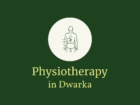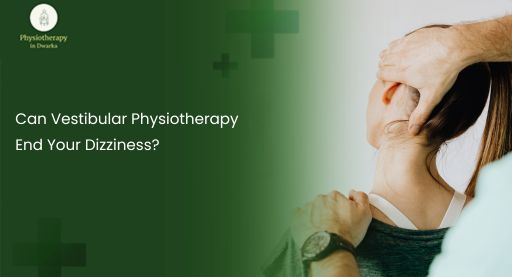Ever felt like the room’s spinning, even though you’re standing perfectly still? That unsettling dizziness can knock the wind right out of your sails. For many, it’s more than just a passing sensation, it’s a sign of a balance disorder. Here’s the big question: Can vestibular physiotherapy really put an end to your dizziness?
The short answer? Yes, it often can. By targeting the inner ear and brain pathways responsible for balance, this specialised therapy helps retrain your body and brain to work together. Instead of popping pills for quick fixes, you’re investing in long-term relief that tackles the root cause, not just the symptoms.
Why Is Vestibular Physiotherapy a Game-Changer?
When dizziness strikes, it doesn’t just throw you off physically, it can rattle your confidence too. Walking across the room suddenly feels like a tightrope act. That’s where vestibular physiotherapy swoops in.
This therapy zeroes in on the vestibular system (your inner ear balance centre) to:
- Reprogram faulty balance signals
- Improve coordination and stability
- Reduce episodes of vertigo
- Train your body to adapt to triggers more efficiently
It’s not magic, but it sure feels like it when you regain control of your day without worrying about sudden dizzy spells.
How Does Vestibular Physiotherapy Actually Work?
Here’s the deal, it’s all about neuroplasticity. Fancy word, right? But it simply means your brain can learn new tricks. Through guided exercises, vestibular physiotherapy teaches your brain to adapt when your inner ear is misfiring.
These exercises fall into three main categories:
- Habituation – Repeatedly exposing yourself to movements that trigger dizziness until your brain desensitises.
- Gaze Stabilisation – Training your eyes and head to work together so you can focus without feeling woozy.
- Balance Training – Improving stability through posture control, strength, and coordination drills.
Over time, your body builds resilience, making dizzy episodes less frequent and less intense.
What is Vestibular Physiotherapy?
Great question! Vestibular physiotherapy is a specialised form of physical therapy that deals specifically with dizziness, vertigo, and balance disorders caused by inner ear or brain issues. It’s tailored for conditions such as:
- Benign Paroxysmal Positional Vertigo (BPPV)
- Labyrinthitis
- Vestibular neuritis
- Concussion-related dizziness
- Age-related balance decline
Instead of just masking the problem, therapists dig deep to retrain your system for long-term results.
What Are Three Symptoms for Vestibular Dysfunction?
Spotting vestibular dysfunction early can make recovery smoother. Three common red flags include:
- Frequent Dizziness or Vertigo – That spinning or floating sensation.
- Unsteady Walking – Feeling like the ground is shifting beneath your feet.
- Blurry Vision with Movement – Difficulty focusing when you turn your head.
Other symptoms like nausea, headaches, or brain fog can tag along too, making life feel like you’re permanently jet-lagged.
What Are Vestibular Therapy Exercises?
So, what exactly happens in therapy? You won’t be pumping iron or running marathons. Instead, exercises are precise, gentle, and designed to retrain your brain. Some common examples include:
- Head Turns with Eye Focus – Move your head side to side while keeping your eyes fixed on a target.
- Balance Challenges – Standing on uneven surfaces to force your body to adjust.
- Repositioning Maneuvers – Special head movements (like the Epley manoeuvre) that shift crystals in the inner ear causing vertigo.
- Walking Drills – Combining steps with head turns to improve stability.
The goal isn’t to push you harder, but to steadily rebuild your balance confidence.
Vestibular Physiotherapy Near Delhi, What Can You Expect?
If you’re searching for vestibular physiotherapy near Delhi, you’ll likely come across clinics offering tailored recovery programs. Typically, a session starts with an assessment: your therapist checks eye movements, balance control, and symptom triggers. From there, a plan is created just for you.
Delhi-based physiotherapy centres often combine traditional rehab with advanced tech like motion sensors or virtual reality balance tools, giving patients the best of both worlds.
Benefits That Go Beyond Balance
You might think vestibular therapy only sorts out dizziness, but wait, there’s more:
- Boosts confidence in daily movements
- Reduces the risk of falls, especially in older adults
- Improves mental clarity by reducing brain fog
- Helps manage motion sensitivity in cars, lifts, or crowded spaces
When your balance improves, so does your quality of life.
Tips to Support Recovery at Home
Therapy doesn’t end when you walk out of the clinic. Your daily routine plays a huge role. Try these tips:
- Stay active (gentle walking does wonders)
- Keep hydrated, dehydration can worsen dizziness
- Sleep well, as fatigue amplifies symptoms
- Avoid sudden head movements early in recovery
- Stick to home exercise plans given by your physiotherapist
Consistency is your best friend here. Skipping exercises is like pressing pause on your progress.
FAQs
- What is vestibular physiotherapy?
It’s a specialised therapy that treats dizziness, vertigo, and balance issues by retraining your brain and body to work together. - What are three symptoms for vestibular dysfunction?
The big three are dizziness/vertigo, unsteady walking, and blurry vision with movement. - What are vestibular therapy exercises?
These include gaze stabilisation drills, balance training, and repositioning manoeuvres designed to reduce dizziness. - How long does it take for vestibular therapy to work?
Everyone’s different, some notice improvements within weeks, while others need a few months for significant relief. - Can I find vestibular physiotherapy near Delhi?
Yes, several clinics near Delhi specialise in treating balance and dizziness disorders with customised therapy programs.
Conclusion
So, back to the big question: Can vestibular physiotherapy end your dizziness? For many people, the answer is a resounding yes. By retraining the balance system, reducing vertigo triggers, and restoring confidence in movement, this therapy provides hope where pills and quick fixes often fail.
If dizziness has been calling the shots in your life, it’s time to flip the script. With the right therapist, tailored exercises, and a pinch of patience, you’ll soon find yourself walking steady, clear-headed, and ready to embrace everyday life again, without the spin.

